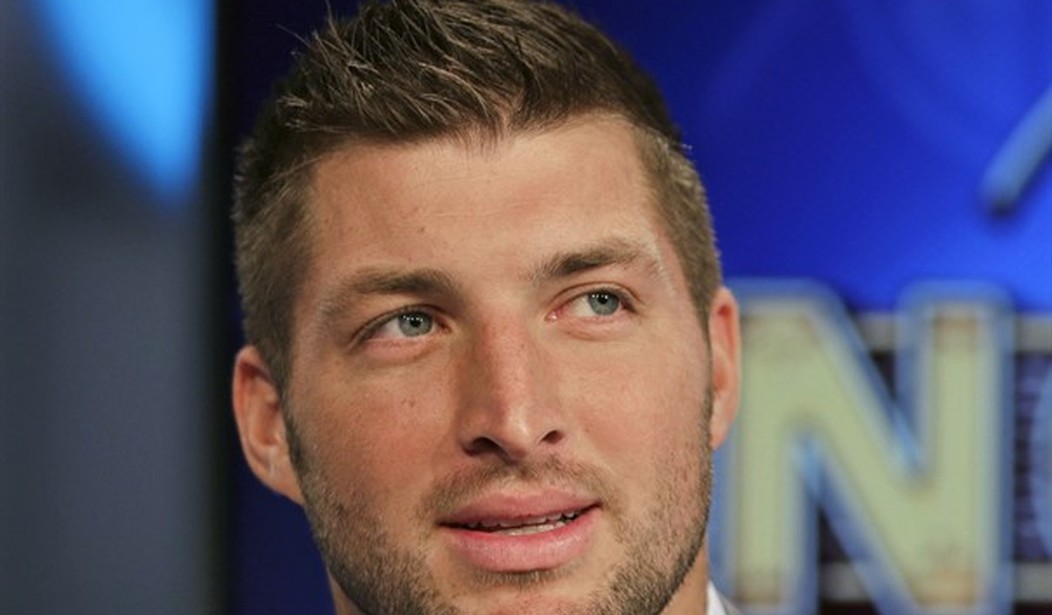Tim Tebow is a two-time college national champion, Heisman Trophy winner, first-round NFL draft pick, and former quarterback for the Denver Broncos and New York Jets. Outside of his career in sports, Tebow’s unapologetic Christian faith has made him an American cultural icon.
In his capacity as a motivational speaker, he’s released several books, including Mission Possible last month, which you can order here. Tebow spoke with me about his book (audio below), explaining how young people can specifically benefit from it.
Cameron Arcand: What motivated you to write this book? You already have a few titles to your name. What makes this one different?
Tim Tebow: Honestly, it was something that had been on my heart for quite a while, a couple years or so. I think what was really on my heart was just this feeling. It’s probably one of the biggest questions I’ve gotten for the last 10 years is, “But Timmy, how do I know what my purpose is? How do I know what my mission is? How do I know what my calling is? And it’s this feeling that is so daunting for so many people. So I wanted to write Mission Possible to encourage people. It doesn’t have to be daunting. It doesn’t have to be overwhelming. It doesn’t have to be selling everything and going to a third-world country. It could start with the small things in your life, with the small choices, with the little things, but Mission Possible is supposed to be an encouragement for people to go out there and truly make their lives count. Possible means “to be able.”
I want people to know that they’re able to live out their purpose, their calling, and to live out the mission that God has for their life, and to truly go create a life that counts. I didn’t want it to feel overwhelming. I didn’t want it to have to, you know, feel to people like, “Oh my gosh, I gotta go, you know, study the New Testament before I can ever do this.” I want people to know it can be daily in the small things. And yes, sometimes it can be in big, in the macro parts of our life, but it can be in the small steps to encourage people in the little things and the daily things that we can go and make an impact. In our life, wherever you are with whatever you have, it’s not just about one day if you have a platform and you’re Billy Graham. No, it’s about this day with wherever God has put you with whatever he’s given you, you can impact the world for the better. You can live out the mission and it is possible.
CA: But that term purpose, like you said, tends to intimidate people quite a bit.
TT: Yes. A hundred percent.
Recommended: Tik Tok-ing Points
CA: In your own view, how do you personally define it in a way that doesn’t scare people off, but also gives them some conviction as well?
TT: I mean, literally, the definition is the reason something is done, used, created, or exists. I don’t wanna change the definition cause we can’t. That is the definition, but I want to encourage people that the reason that they exist in the macro is to love God and to love people. But in the micro, their specific callings, that there is a reason that they are here, and I don’t want them to have to feel like it is going to take searching throughout the universe to find it. But it can be one of the ways that we talk about it is “Have your eyes ever been open to a need? Has your heart ever been pricked to want to do something about that?” Right? So that could be someone on the side of the street.
It could be your neighbor, it could be a classmate, it could be in your school. It could be also going to the mission field. It could be so many different things, but so many people search or wanna search hard for it. When I think that, yes, it is a unique, deep concept, but I also think it could just start in the practical of, “Hey, this is something that I saw in my heart, have compassion and wanna do something.” Okay, cool. Let’s start there, step into it. Because it might not be the end destination, but I do think that’s gonna be a place where you can learn, you can grow. God can continue to adapt you and your life to whatever he has next.
God can do anything that he wants, but it’s funny when you listen to a lot of people that have been impacted, they don’t usually have a testimony where they’re like, “Hey, I was watching Netflix and all of a sudden, I just, you know, felt this calling to go do this.” No, most of the time it’s they were talking to someone, they were doing something, they were impacting someone. They were serving somewhere and God impacted their life. That’s how, for me is where my life was impacted, when I was in the jungles of the Philippines, and I met a boy who was born with his feet on backward. Because of that, he was viewed as cursed. He was viewed as a throwaway, but I knew he wasn’t a throwaway to God and God put it on my heart that he better not be a throwaway to me. So that was a big part of the start of my calling, the fighting for people that couldn’t fight for themselves. I think every one of us has a unique calling and our micro missions in life.
CA: Something that I really appreciate about your work is how you’re able to get real with it. We talk a lot as Christians about those mountaintop moments and then also those valley moments. What would you consider to be one of your valley moments and what did you learn through it?
TT: I think there’s been many of them, and I don’t know that valley moments always have to be what they are to the world. A valley to you might be different than what it is to the world, you know? I can’t even count all the times that I’ve been cut now, you know. And to me, those are disappointing moments, right? Those are frustrating moments. I’ll share one that, just a few months ago when I’m playing for the Jaguars and I get cut. That’s a disappointing moment, but you know what? It was something that I’m so grateful for now. And here’s why: The same day that I got cut is the same day that everything started to happen in Afghanistan. You know, within very little time, because I just got cut and I have the freedom in my schedule.
I’m in the Middle East, and I’m flying there, and I’m helping in different countries. We’re helping get people out and evacuate. Then we’re helping with refugees and we’re helping with orphans and we’re helping in a lot of different ways. That would’ve never happened if I would’ve been playing football, and if I wouldn’t have gotten cut. The reality is I would’ve had something else in my schedule and I wouldn’t have had the freedom to go do it. I remember flying from one Middle East country to the other and on that flight, just talking to God, it was really the first time, honestly, in a while I could say, “Hey God, I’m grateful for letting me get cut, because I know this is what I’m supposed to do. This is more important than what I would’ve been doing, if you would have given me what I wanted, and this is what I know I’m supposed to do.” That was a really awesome time in my life. That was just this past August, you know, of being like, “Man, God, I thought you opened up all these doors for me to go back and do this in the NFL.” But he was saying, “No, no, no, I got something so much more important than a game is.
Related: Will Smith and Chris Rock Are Terrible Examples for Young Men
CA: A lot of young men struggle to find strong guidance in their everyday lives, especially college students like myself. What advice would you kind of give them, or what would you tell your college self?
TT: I think that there’s more distractions maybe now for our young people than ever before. It’s also faster to get to those distractions. I think the voices are maybe louder now than ever before. That’s why I think it is so important, not just to try to block it out, but to have other voices that are louder in your life. I actually saw a stat the other day that said that some groups of young people are spending 7.7 hours a day on their devices. I was just like, “Oh my gosh, like that is so much time, and it is so much input.” Honestly, not all of that is good input. And 18-34-year-olds, two-thirds of them say that there’s no one in the world that believes in them.
A third of them say that they’re lonely most of the time or all of the time. But we live in a society where you have more communication or faster access to communication than ever before. But what is showing is it’s not actually community. It is just communication. We are built for community and for relationships and for real, deep input, not just to be able to watch and see other people living their “sort of real, but sort of fake” lives on social media. Why do you think filters are so important?
There’s also another study that says 12% of our daily thoughts are spent on some form of comparison. So the challenge is that young people are facing what everybody faces, but really young people. They’re being told you need to look, act, or do what this person is doing on social media. So if their life doesn’t match up to that, they feel inadequate or not enough. They need to change and adapt to that. What I want to encourage people is you are created in love, by love, and for love. You don’t need to be anybody else because God didn’t make a mistake on you. If he wanted you to be like someone else, he would’ve made you like somebody else, but he didn’t. He made you exactly the way you are.
I want to encourage them to be the best version of themselves, not a second-class version of somebody else, because they are incredible just the way they are. They have a mission. They have a purpose. When the Bible says that they’re fearfully and wonderfully made, what it means is that they’re awesome, and they’re unique, and set apart. When every life understands or any life understands that they are so valuable to the creator of this universe, that he sent his son on a mission for them. I don’t want it to give people arrogance. I want it to give people confidence, God confidence, in who they were created to be.
CA: I really appreciate that. I feel like it’s a fading message almost. My last question for you pertains to a group even younger than that. A lot of parents are looking for positive messages for their children because it seems like they’re still struggling to find those positive messages for those young kids as well. You do have a book coming out on April 12 called Bronco and Friends: Mission Possible. What’s the goal behind that?
TT: It is really focused on helping one another … and how it’s always the right time to do the right thing to help someone in need.
There are so many messages that are sent to our children and at the youngest age, and I want to send the message and encourage them that it is always the right time to go help. One of their classmates that’s getting bullied, it’s always the right time to go help their classmate that has been made fun of. They can, even at a young age, go and love them and help them and support them … I think it is so important because even at a young age, we can all look back and remember how some kids were made to be left out or not encouraged. So this book is a very easy read to encourage them to love one another and help one another, especially those that need help in moments where maybe they’re left out.








Join the conversation as a VIP Member